Politics
Far From a Kremlin Stooge, Trump’s Real Record on Russia
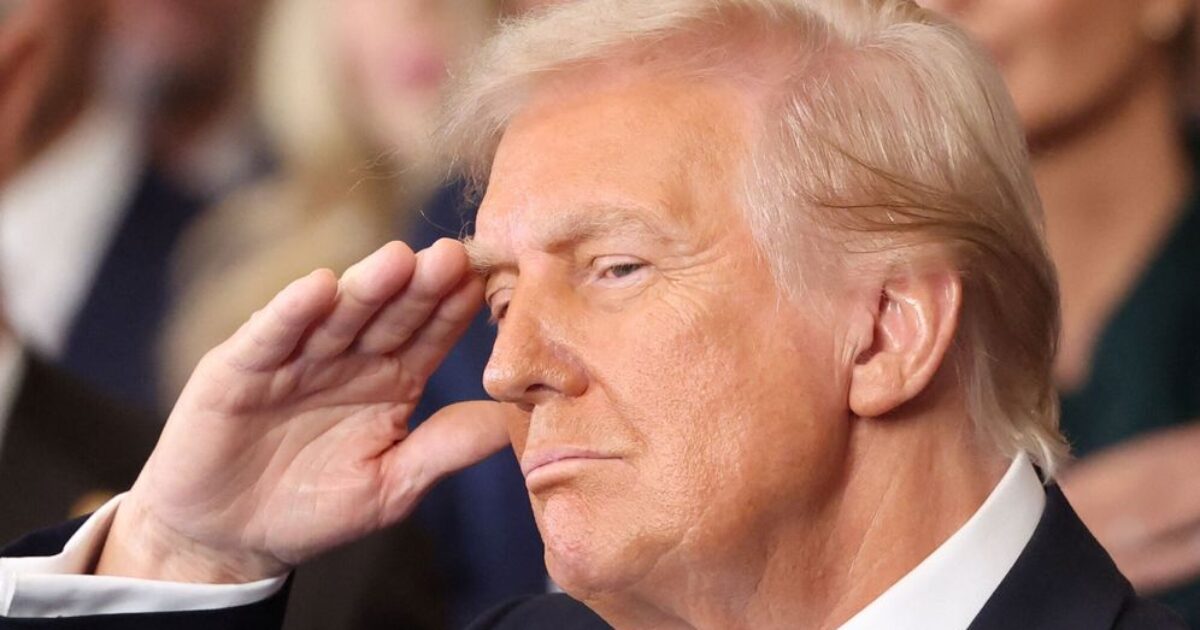
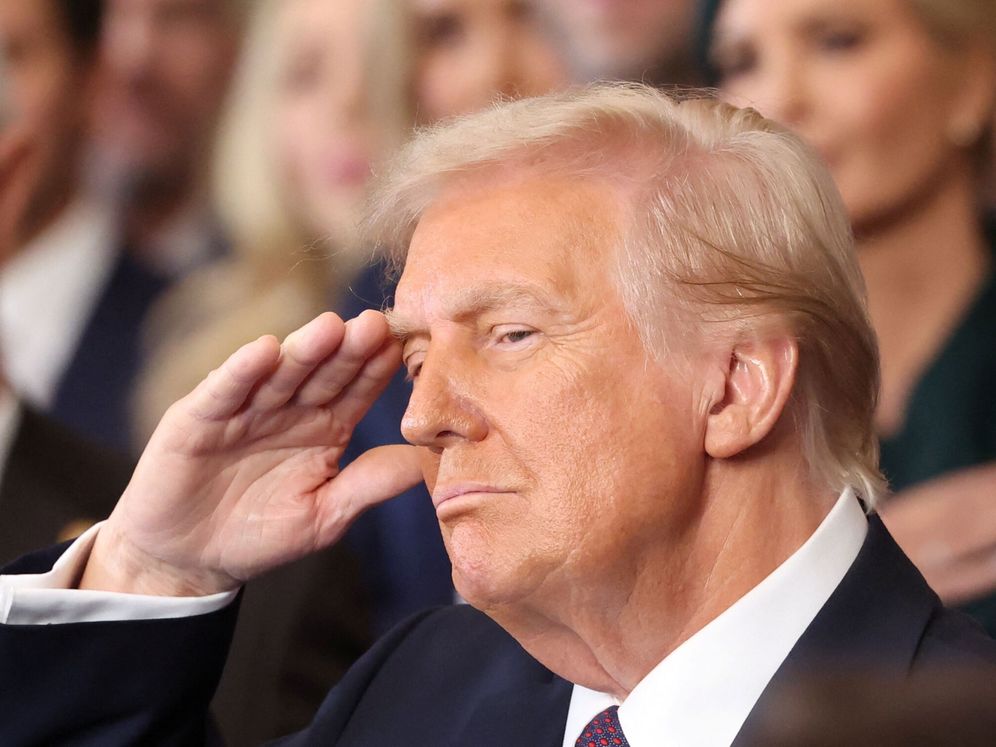 Photo courtesy of El Confidencial
Photo courtesy of El Confidencial
Allegations that Trump is a Russian asset are preposterous, especially given his strong anti-Russia stance during his first presidency.
Rather than accusing him of being pro-Russia, critics should listen carefully to what he is actually saying: he wants the Ukraine war to end, with people stopping the killing, and for the U.S. to stop financing it.
He has even offered Ukraine a peace deal that includes minerals for defense and guarantees Ukraine’s security without requiring the country to join NATO, which would address Putin’s primary concern regarding Ukraine.
During his first term, President Donald Trump adopted several policies that were tough on Russia, despite his more conciliatory rhetoric towards President Vladimir Putin.
Between 2017 and 2019, the Trump administration took 52 actions, including sanctions, military assistance, and diplomatic measures, all targeting Russia’s malign activities.
These actions were primarily a response to Russia’s interference in the 2016 U.S. elections, its involvement in Ukraine, and its use of chemical weapons in the UK.
In 2018, for instance, the administration-imposed sanctions on Russian individuals and entities tied to election interference, cyberattacks, and the poisoning of former spy Sergei Skripal.
Additionally, the U.S. expelled Russian diplomats and imposed export restrictions following Russia’s violation of the Intermediate-Range Nuclear Forces (INF) Treaty.
Military measures were also a key part of the strategy. The U.S. provided Ukraine with defensive weapons to counter Russian-backed separatists and sanctioned Russia’s military and intelligence sectors.
In response to the Skripal poisoning, the administration imposed further sanctions under the Chemical and Biological Weapons Control and Warfare Elimination Act.
It also approved lethal weapons sales to Ukraine, reaffirmed the U.S. rejection of Crimea’s annexation, and bolstered Ukraine’s naval capabilities.
Beyond these actions, the Trump administration took additional steps to limit Russia’s influence, such as banning the use of Kaspersky Labs software on government computers due to its ties to Russian intelligence.
It also released the “Russian Oligarch List” and continued imposing sanctions under the Countering America’s Adversaries Through Sanctions Act (CAATSA), targeting Russian elites and companies involved in illicit activities.
Despite Trump’s amicable interactions with Putin, these policies demonstrate a firm stance against Russian aggression and interference in international affairs.
The 2017 Countering America’s Adversaries Through Sanctions Act (CAATSA) mandated sanctions on Russian individuals, companies, and officials involved in these activities.
Despite some delays in enforcement, sanctions were ultimately imposed, with the Trump administration gradually adding more names to the list. These measures targeted Russian oligarchs and government officials connected to Putin’s inner circle.
In 2018, following the poisoning of former Russian spy Sergei Skripal in the UK, the Trump administration expelled 60 Russian diplomats and closed Russia’s consulate in Seattle as part of a coordinated international response.
The U.S. also imposed sanctions on Russian energy companies, including those involved in the Nord Stream 2 pipeline project, which was seen as a major effort by Russia to bypass Ukraine and extend its influence in Europe.
Sanctions were also levied against Rosneft Trading, a subsidiary of the Russian oil giant, for its dealings with Venezuelan oil.
Alongside these sanctions, military actions were also taken.
The Trump administration authorized the sale of lethal weapons to Ukraine, including Javelin anti-tank missiles, marking a significant departure from previous U.S. policy under the Obama administration.
This move was seen as a direct challenge to Russian influence in Ukraine and aimed to strengthen Ukraine’s defenses against Russian-backed separatists.
The Trump administration took several steps to deter Russian interference in future U.S. elections.
The Cybersecurity and Infrastructure Security Agency (CISA) worked to bolster U.S. election infrastructure defenses against cyberattacks, particularly from Russian actors.
This included attributing several major cyberattacks to Russian state-backed hackers, such as the SolarWinds hack in 2020.
In addition, Trump approved the deployment of thousands of U.S. troops to Eastern European NATO allies, including Poland and the Baltic states, as part of NATO’s broader deterrence strategy against Russian aggression.
Following the 2018 poisoning of Sergei Skripal and his daughter in the UK, the U.S. joined the UK and other allies in expelling over 150 Russian diplomats in a coordinated diplomatic protest.
The administration also indicted several Russian individuals for cyberattacks and election interference, including members of Russia’s GRU (military intelligence) and the Internet Research Agency.
The Department of Justice and FBI pursued aggressive investigations into Russian interference in the 2016 election, culminating in special counsel Robert Mueller’s investigation, which resulted in multiple indictments of Russian individuals and entities.
Despite Trump’s often criticized diplomacy toward Putin, these actions reflect a series of policies that were, in practice, hostile toward Russia—especially in terms of economic sanctions, military support for Ukraine, and efforts to curb Russian activities both in the U.S. and internationally.
The post Far From a Kremlin Stooge, Trump’s Real Record on Russia appeared first on The Gateway Pundit.
Politics
Black Lives Matter Activist in Boston Pleads Guilty to Federal Fraud Charges – Scammed Donors to Fund Her Lifestyle

Screencap of YouTube video.
A Black Lives Matter activist in Boston named Monica Cannon-Grant pleaded guilty to federal charges this week, admitting that she scammed donors and used their money to fund her own lavish lifestyle.
Cannon-Grant was previously held up as an admired figure. The city of Boston named her the Bostonian of the year at one point for her ‘social justice activism’ and she was even recognized by the Boston Celtics basketball team for her efforts.
She is now facing a minimum of two years in prison.
The New York Post reports:
BLM-linked activist admits conning donors to fund her lavish lifestyle
A once-celebrated Boston social activist has pleaded guilty to defrauding donors — including Black Lives Matter — out of thousands of dollars that she used as a personal piggy bank.
Monica Cannon-Grant, 44, pleaded guilty Monday to 18 counts of fraud-related crimes that she committed with her late husband while operating their Violence in Boston (VIB) activists group, according to the US Attorney’s Office in Massachusetts.
The activist scammed money — including $3,000 from a BLM group — while claiming it was to help feed children and run protests like one in 2020 over the murder of George Floyd and police violence.
Cannon-Grant also conned her way into getting $100,000 in federal pandemic-related unemployment benefits — which she used to pay off her personal auto loan and car insurance policy.
But she has now confessed to transferring funds to personal bank accounts to pay for rent, shopping sprees, delivery meals, visits to a nail salon — and even a summer vacation to Maryland.
Just amazing.
Monica Cannon-Grant stole from donors, scammed the government, and lived it up while preaching about oppression. BLM grift is the only nonprofit where fraud is part of the mission statement. https://t.co/ir3q9lqYrh
— Matthew Newgarden (@a_newgarden) September 23, 2025
BREAKING: BLM activist Monica Cannon-Grant pleads guilty to 27 fraud charges, misusing over $1M from Violence in Boston for personal gain. Echoes Sir Maejor Page’s $450K scam conviction. A wake-up call for nonprofit accountability. pic.twitter.com/N9vvD369gB
— (@pr0ud_americans) September 14, 2025
Here’s a local video report:
She should pay back every penny.
The post Black Lives Matter Activist in Boston Pleads Guilty to Federal Fraud Charges – Scammed Donors to Fund Her Lifestyle appeared first on The Gateway Pundit.
Politics
Keith Olbermann Backpedals Furiously With Apology for Threatening CNN’s Scott Jennings – Jennings Responds (VIDEO)
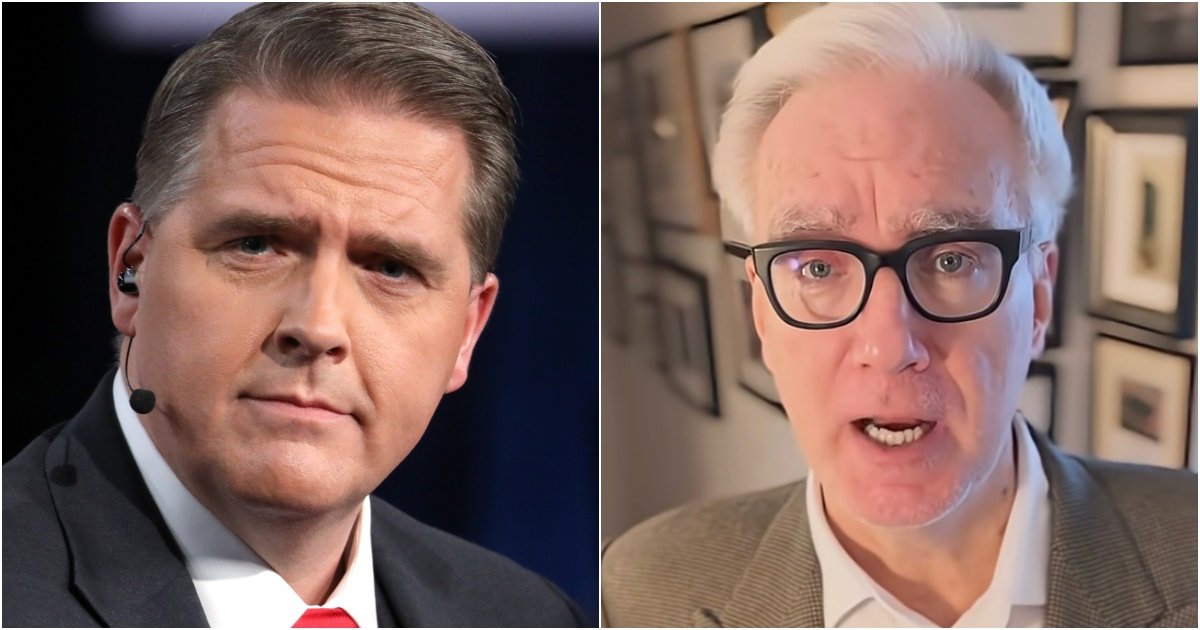
As the Gateway Pundit reported yesterday, former MSNBC host and generally unhinged leftist Keith Olbermann, appeared to threaten CNN’s conservative pundit Scott Jennings on Twitter saying, ‘You’re next motherf**ker.’
Well, Olbermann may have gotten a phone call or a visit from the FBI because today he walked back those comments with a full-throated apology.
RedState has an update:
To quickly recap, Scott Jennings, a Salem Media Network radio host and conservative CNN political commentator, reacted to breaking news on Monday that Kimmel had been reinstated by tweeting, “So basically his employer suspended him for being an insensitive pr**k, and we don’t live in an authoritarian regime? Got it.”
This enraged Olbermann, who proceeded to tweet what many, including Jennings, perceived to be a threat. “You’re next, motherf**ker. But keep mugging to the camera.” Jennings tagged Patel and included a screengrab of the tweets in response.
Though the FBI hasn’t commented as to whether an investigation was launched, Olbermann ostensibly appears to have thought twice about what he tweeted and deleted, apologizing profusely in tweets posted on Tuesday and claiming what he wrote was “misinterpreted”:
See Olbermann’s tweet below:
I apologize without reservation to @ScottJenningsKY
Yesterday I wrote and immediately deleted 2 responses to him about Kimmel because they could be misinterpreted as a threat to anything besides his career. I immediately replaced them with ones specifying what I actually meant. pic.twitter.com/SPWLb73nEk
— Keith Olbermann (@KeithOlbermann) September 23, 2025
I oppose and condemn political violence, and the threat of it. All times are the wrong time to leave even an inadvertent impression of it – but this time is especially wrong
I should've acknowledged the deletion and apologized yesterday. I'm sorry I delayed.
— Keith Olbermann (@KeithOlbermann) September 23, 2025
Scott Jennings, always a class act, offered this hilarious response:
SCOTT JENNINGS: “Marking myself SAFE from that NUT, Keith Olbermann!” pic.twitter.com/EYZX6vm5Oh
— Dustin Grage (@GrageDustin) September 23, 2025
Keith Olbermann really needs help. The guy is just so out of control.
The post Keith Olbermann Backpedals Furiously With Apology for Threatening CNN’s Scott Jennings – Jennings Responds (VIDEO) appeared first on The Gateway Pundit.
Politics
Where is Lance Twiggs? Kirk Assassin’s Transgender Lover Has Vanished

 Charlie Kirk assassin Tyler Robinson and roommate Lance Twiggs
Charlie Kirk assassin Tyler Robinson and roommate Lance Twiggs
Charlie Kirk assassin Tyler Robinson lived with his transgender partner – a male-to-female trans named Lance “Luna” Twiggs.
The FBI used Robinson’s texts with his transgender partner to solidify that Robinson was the assassin. Lance Twiggs has not been charged with any crime; however, federal authorities are still investigating.
Last week, Utah authorities released the text exchange between Tyler Robinson and his transgender lover, Lance Twiggs, sent shortly after Kirk’s assassination.
Utah County District Attorney Jeff Gray announced seven charges against Charlie Kirk assassin Tyler Robinson. They will also be seeking the death penalty.
Robinson was charged with:
– Count 1: Aggravated murder (capital offense)
– Count 2: Felony reckless discharge of a firearm causing bodily injury
– Count 3: Felony obstruction of justice for hiding the firearm
– Count 4: Felony obstruction of justice for discarding the clothing he wore during the shooting
– Count 5: Witness tampering for asking roommate to delete incriminating messages
– Count 6: Witness temperating for demanding trans roommate stay silent, and not speak to police
– Count 7: Commission of a violent offense in the presence of a child
Jeff Gray released the chilling texts between Tyler Robinson and his “love” Lance Twiggs.
Read the text exchange here:
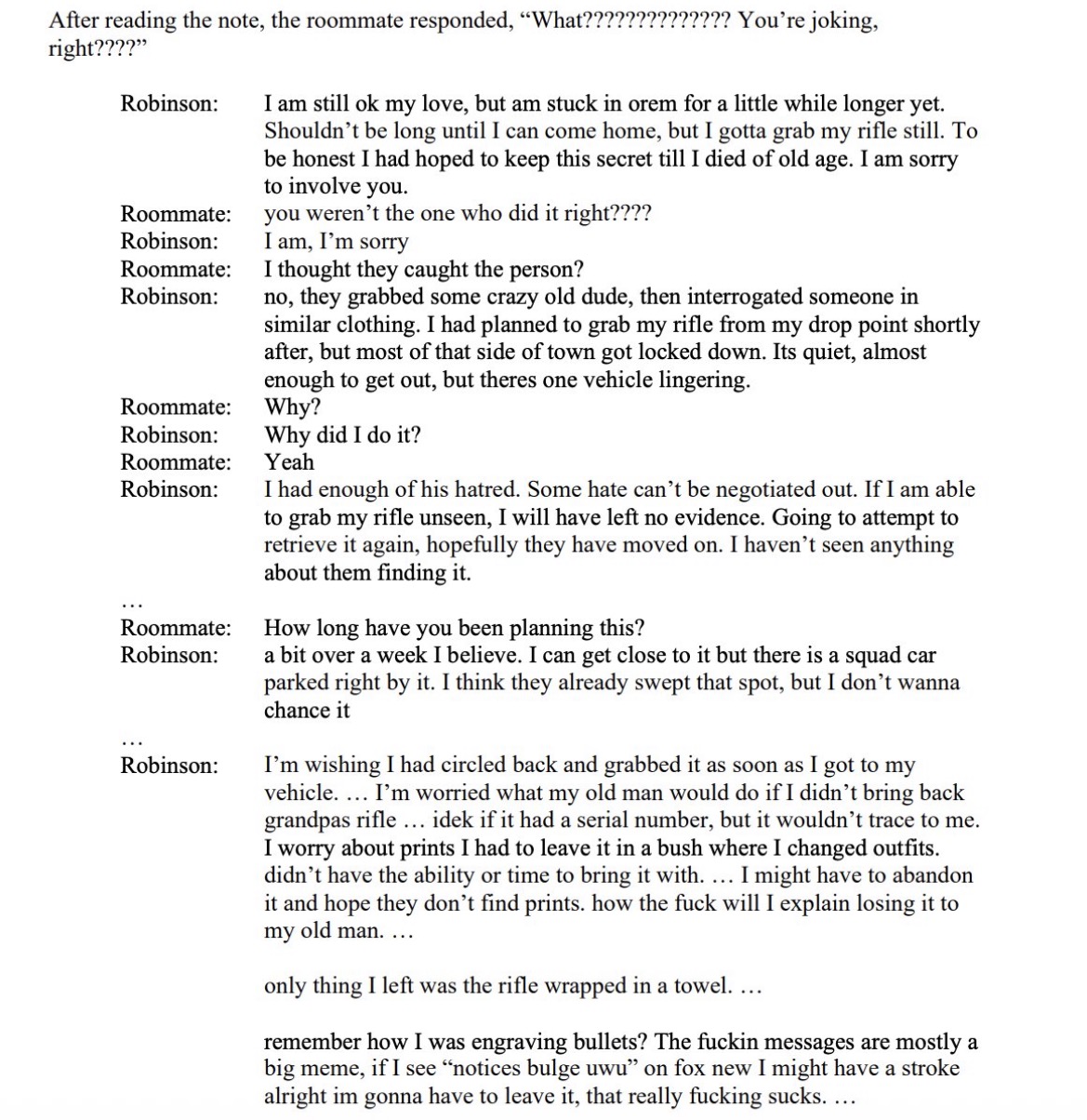 Tyler Robinson texts with transgender lover Lance Twiggs / 1
Tyler Robinson texts with transgender lover Lance Twiggs / 1
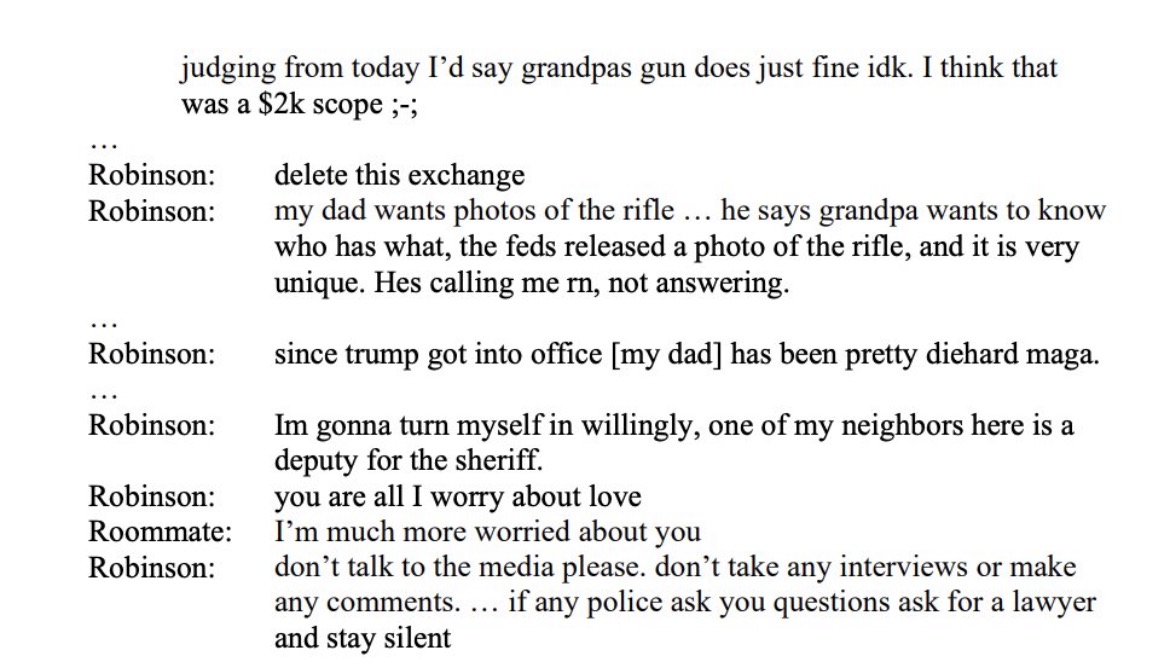 Kirk assassin Tyler Robinson texts with transgender lover Lance Twiggs / 2
Kirk assassin Tyler Robinson texts with transgender lover Lance Twiggs / 2
Lance Twiggs was reportedly cooperating with the FBI, however, according to the Daily Mail he has seemingly vanished.
“If [Lance Twiggs] ever comes back, it will be in a body bag,” a neighbor said to the Daily Mail. “That’s not a threat – I’m just saying that there are so many people who want a piece of him he’d be mad to show his face in public again. This was a generational event.”
The Daily Mail reported:
The Trans boyfriend of Charlie Kirk’s alleged assassin has fled their former lovenest – and locals tell the Daily Mail they never want to see him again.
Lance Twiggs, 22, was led away for questioning when police swooped on the smart three-bed condo he shared with accused gunman Tyler Robinson, 22.
Shaken neighbors say the part time plumber has not been back to the $320,000 property in St. George, Utah – one declaring: ‘Good riddance. I never want to see either of them again.’
His beaten-up Infinity compact is still parked in his space with his work gear tossed across the back seat and a sandwich wrapper and a drink on the front passenger seat.
Upstairs lights have been left on for more than a week and notes and Amazon packages are piling up outside the home owned by Twiggs’s devout Mormon family.
The post Where is Lance Twiggs? Kirk Assassin’s Transgender Lover Has Vanished appeared first on The Gateway Pundit.
-

 Entertainment6 months ago
Entertainment6 months agoNew Kid and Family Movies in 2025: Calendar of Release Dates (Updating)
-

 Entertainment3 months ago
Entertainment3 months agoBrooklyn Mirage Has Been Quietly Co-Managed by Hedge Fund Manager Axar Capital Amid Reopening Drama
-
Tech6 months ago
The best sexting apps in 2025
-

 Entertainment5 months ago
Entertainment5 months agoKid and Family TV Shows in 2025: New Series & Season Premiere Dates (Updating)
-

 Tech7 months ago
Tech7 months agoEvery potential TikTok buyer we know about
-
Tech7 months ago
iOS 18.4 developer beta released — heres what you can expect
-

 Tech7 months ago
Tech7 months agoAre You an RSSMasher?
-

 Politics7 months ago
Politics7 months agoDOGE-ing toward the best Department of Defense ever



